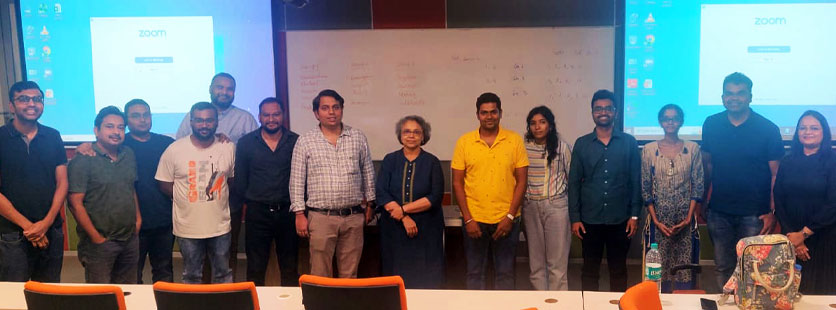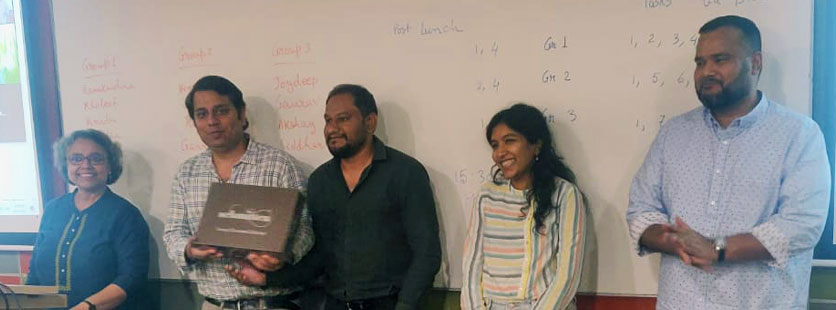Course Schedule
Students are admitted and can enroll in the program in either fall or spring term. Enrolled students are automatically registered for two courses per term and complete the degree within six 10-week terms. Course descriptions can be found below.
Course schedule in table form.
|
Term 1
|
Term 2
|
|
MS_DSP 400 Math for Modelers
|
MS_DSP 420 Database Systems
|
|
MS_DSP 401 Applied Statistics with R
|
MS_DSP 476-DL Business Process Analytics
|
|
|
|
Term 3
|
Term 4
|
|
MS_DSP 432-DL Foundations of Data Engineering
|
MS_DSP 485 Data Governance, Ethics, and Law
|
|
MS_DSP 460 Decision Analytics
|
MS_DSP 422(a) Practical Machine Learning (.5 credit in-class component)
MS_DSP 422(b) Practical Machine Learning (.5 credit required on-ground residency, held in person at either the Chennai or Gurgaon campus, India)
|
|
|
|
Term 5
|
Term 6
|
|
MS_DSP 453 Natural Language Processing
|
MS_DSP 462-DL Computer Vision
|
|
MS_DSP 458 Artificial Intelligence & Deep Learning
|
MS_DSP 498(a) Capstone (in-class component)
MS_DSP 498(b) Capstone (.5 credit required on-ground residency, held in person at either the Chennai or Gurgaon campus, India)
|
*MS_DSP 422 and MS_DSP 498 are required on-ground residencies. Residencies are held at one of the Great Lakes Institute of Management campuses. Students are expected to travel to the designated Great Lakes campus and be present during for the entire residency.
Residency dates, locations, required fees, and expectations will be provided to enrolled students well in advance to allow for financial and travel planning.
Master of Science in Data Science Programme Course Descriptions
MS_DSP 400-DL Math for Modelers
Students learn how to build and interpret mathematical models of real-world phenomena in many areas. The course covers linear algebra, discrete mathematics, calculus and graph theory, with an emphasis on applications in data science and data engineering. It provides an introduction to these fields of mathematics prior to enrolling in courses that assume understanding of mathematical concepts.
Prerequisites: None
MS_DSP 401-DL Applied Statistics with R
This course teaches fundamentals of statistical analysis. This includes evaluating statistical information, performing data analyses, and interpreting and communicating analytical results. Students will learn to use the R language for statistical analysis, data visualization, and report generation. Topics covered include descriptive statistics, central tendency, exploratory data analysis, probability theory, discrete and continuous distributions, statistical inference, correlation, multiple linear regression, contingency tables, and chi-square tests. Selected contemporary statistical concepts, such as bootstrapping, are introduced to supplement traditional statistical methods.
Prerequisites: None
MS_DSP 420-DL Database Systems and Data Preparation
This course introduces data management and data preparation with a focus on applications in large-scale analytics projects utilizing relational, document, graph, and graph-relational databases. Students learn about the relational model, the normalization process, and structured query language. They learn about data cleaning and integration, and database programming for extract, transform, and load operations. Students work with unstructured data, indexing and scoring documents for effective and relevant responses to user queries. They learn about graph data models and query processing. Students write programs for data preparation and extraction using various data sources and file formats.
Prerequisite: None
MS_DSP 422-DL Practical Machine Learning
The course introduces machine learning with business applications. It provides a survey of statistical and machine learning algorithms and techniques including the machine learning framework, regression, classification, regularization and reduction, tree-based methods, unsupervised learning, and fully-connected, convolutional, and recurrent neural networks. Students implement machine learning models with open-source software for data science. They explore data and learn from data, finding underlying patterns useful for data reduction, feature analysis, prediction, and classification.
Prerequisites: (1) MS_DSP 400 Math for Modelers and (2) MS_DSP 401 Applied Statistics with R.
MS_DSP 432-DL Foundations of Data Engineering.
This course introduces data engineering concepts and technologies relevant to development and operations (DevOps). It reviews design principles and development processes for data pipelines in analytics applications, focusing on containerized microservices and cloud-native applications. It reviews data exchange formats, process concurrency control, communication protocols, application programming interfaces, distributed processing, and systems architecture. Students learn about automated deployment and scaling of batch, interactive, and streaming data pipelines. They learn how to design, implement, and maintain applications in cloud and on-premises environments. This is a programming-intensive course that includes a full-stack development project.
Prerequisites: (1) MS_DSP 400 Math for Modelers and (2) MS_DSP 420 Database Systems
MS_DSP 453-DL Natural Language Processing
This course explores cutting-edge developments in computational linguistics and machine learning, with a focus on deep learning techniques. Students work with unstructured and semi-structured text, transforming text into numerical vectors and converting higher-dimensional vectors into lower-dimensional ones for analysis and modeling. The course covers parts-of-speech parsing, information extraction, semantic processing, text classification, sentiment analysis, text embeddings, topic modeling, text summarization and generation, and question answering. Students explore large-scale language models, particularly generative pretrained transformers (GPTs). This is a project-based course with extensive programming assignments.
Prerequisites: (1) MS_DSP 420 Database Systems and (2) MS_DSP 422 Practical Machine Learning
MS_DSP 458-DL Artificial Intelligence and Deep Learning
An introduction to artificial intelligence, this course illustrates probability-rule-based generative models as well as discriminative models for learning from data. It reviews applications of artificial intelligence and deep learning in vision and language processing. Students learn best practices for building deep learning models for classification and regression. The learn about feature engineering, autoencoders, and strategies of unsupervised and semi-supervised learning, as well as reinforcement learning. This is a project-based course with extensive programming assignments.
Prerequisites: (1) MS_DSP 420 Database Systems and (2) MS_DSP 422 Practical Machine Learning
MS_DSP 460-DL Decision Analytics
This course covers fundamental concepts, solution techniques, modeling approaches, and applications of decision analytics. It introduces commonly used methods of optimization, simulation and decision analysis techniques for prescriptive analytics in business. Students explore linear programming, network optimization, integer linear programming, goal programming, multiple objective optimization, nonlinear programming, metaheuristic algorithms, stochastic simulation, queuing modeling, decision analysis, and Markov decision processes. Students develop a contextual understanding of techniques useful for managerial decision support. They implement decision-analytic techniques using a state-of-the-art analytical modeling platform. This is a problem and project-based course.
Prerequisites: (1) MS_DSP 400 Math for Modelers and (2) MS_DSP 401 Applied Statistics with R
MS_DSP 462-DL Computer Vision.
This course reviews deep learning methods for vision. Students work with raw image files, including digital representations of photographs, hand-written documents, x-rays, and sensor images. They process image data, converting pixels into numeric tensors for subsequent analysis and modeling. The course illustrates real-world applications for visual exploration, object recognition, image classification, facial recognition, remote sensing, navigation, and medical diagnostics. This is a project-based course with extensive programming assignments.
Prerequisites: (1) MS_DSP 420 Database Systems and (2) MS_DSP 422 Practical Machine Learning
MS_DSP 476-DL Business Process Analytics.
This course introduces data-driven management methods, including business process workflows, mining, modeling, and simulation, activity-based costing, constrained optimization, and predictive analytics. Data from business operations, properly recorded in time-stamped logs of activities and their associated costs, represent essential information for business management. Analyzing business activities provides a guide to business intelligence and business process improvements, including those associated with robotic process automation and digital transformation. By reviewing detailed case studies and using commercial and open-source analytics platforms, students learn how data and models can be used to guide management decisions. This is a required course for the Analytics Management specialization.
Prerequisites: None
MS_DSP 485-DL Data Governance, Ethics, and Law
This course introduces data management concepts, including data quality, integrity, usability, consistency, and security. It considers the lineage of data, sometimes referred to as data provenance. It reviews ethical, legal, and technical issues relating to data acquisition and dissemination, as well as privacy protection. The course provides a management introduction to cybersecurity, including network, system, and database security, as well as encryption and blockchain technologies. The course covers laws relating to protecting intellectual property, with discussion of copyrights, patents, and contracts.
Prerequisites: None
MS_DSP 498-DL Capstone
The capstone course focuses upon the practice of data science. This course is the culmination of the data science program. It gives students an opportunity to demonstrate their business strategic thinking, communication, and consulting skills. Business cases across various industries and application areas illustrate strategic advantages of analytics, as well as organizational issues in implementing systems for data science. Students work in project teams, generating business plans and project implementation plans. Students may choose this course or the master’s thesis to fulfill their capstone requirement.
Prerequisites: (1) MS_DSP 453-DL Natural Language Processing and (2) MS_DSP 458-DL Artificial Intelligence and Deep Learning
Programme Curriculum Details
What are the prerequisites for the courses?
See the above program course descriptions for prerequisite information. Some courses, such as 420-DL Database Systems and Data Preparation, have prerequisites which must be taken prior to enrolling. Other courses have recommended, but not required prerequisites to indicate courses or areas of prior knowledge you should have prior to enrolling. As the entirety of DSP is cohort based, you will move through the programme via a prescribed course sequence.
Should you have questions, particularly if you are in danger of failing a course, we recommend you contact the DSP support staff at +91 80 4718 8686 or dsp@mygreatlearning.com
How many hours per week should I dedicate to coursework?
These are rigorous graduate-level courses that require active engagement. Prepare to dedicate 15 to 20 hours to coursework throughout the week in each course (required time varies based on programming experience and academic preparation). Some weeks may require more time, others less, depending on what assignments are due.
How are the courses graded?
Courses are graded using a letter system. All grades of B- and above are considered passing grades.
Is there a minimum GPA I must maintain to obtain the degree?
A cumulative GPA of 3.0 or higher is required for degree conferral. A degree will not be awarded to any student with less than a 3.0 cumulative GPA. If a student’s GPA drops below a 3.0 in any quarter, but they are able to achieve a cumulative GPA of 3.0 or higher by the final course, they will be awarded a degree.
How do I get my grades?
You can access your grades and other relevant student information, including billing, by logging into Caesar.
Does the transcript indicate the Master of Science in Data Science Programme is online?
The online mode of programme delivery is not specified on the transcript. The DSP transcript states that the degree is a Masters of Science in Data Science. Completed courses will appear as they do in the SPS graduate course catalog. For instance, DSP 400 would appear as: MS_DSP 400-DL Math for Data Scientists.
How do I order my transcripts?
For questions about academic records and documents, such as transcripts, please refer to the SPS Office of the Registrar's webpage on the SPS website and send questions to onlinereg@northwestern.edu.
Is DSP an accredited graduate degree?
All undergraduate and graduate degrees at Northwestern’s School of Professional Studies are accredited by the Higher Learning Commission, which can be accessed via our Office of the Provost.
Will I continue to have access to Canvas materials after completion of the degree?
Your NetID will expire after completion of the programme, and you should save any course materials you would like to access at a later point. Instructors manage Canvas pages and may close or remove materials from pages at their discretion.
How many students will be in my class?
Class sections are limited to 25 students.
How is DSP different from the MSDS degree?
Objectives and curricula of the MSDS and DSP degrees are comparable, but they differ in format. DSP is a cohort-based program with two required residencies in India, and any synchronous sessions are specifically tailored to the Indian and Southeast Asian time zones.
How many people have taken the MSDS program?
The MSDS degree is among the oldest and most respected data science programs in the world. At this time, there are approximately 2,700 graduates of the MSDS program.
Programme Content
How many courses?
There are 11 core courses and one capstone course in the programme.
How long are the courses?
Courses are 10 weeks each.
Where can I find course descriptions?
Course descriptions can be viewed online.
Where do I find more information on courses beyond the course description.
Admitted students may view course and teacher evaluations (CTECs) in CAESAR. Please direct CTEC user support questions to ctec@northwestern.edu .
Contact your adviser at dsp@mygreatlearning.com or at +91 80 4718 8686 for additional information or to inquire about viewing sample syllabi. Due dates, assignments, readings, and other elements described in sample syllabi are subject to change. The student is responsible at all times for using the most updated version of a course syllabus.
What textbooks will I need?
A list of textbooks will be provided in your course syllabus, which you will be able to access upon course registration.
Is the programme heavy in math?
DSP is heavy in math. The programme has a significant analytical component. Please read the program course descriptions.
What programming languages are used in courses?
DSP programming languages used in courses include the following. The list below may change as the programme develops.
- MS_DSP 400-0: Python
- MS_DSP 401-0: R
- MS_DSP 403-0: None
- MS_DSP 410-0: R
- MS_DSP 420-0: Python and SQL
- MS_DSP 422-0: Python and TensorFlow
- MS_DSP 430-0: Python
- MS_DSP 453-0: Python
- MS_DSP 458: Python
- MS_DSP 460: Python and R with Excel
- MS_DSP 485-0: None
- MS_DSP 498-0: None, or may vary by instructor and project
What is it like to earn a master's degree online?
At Northwestern University School of Professional Studies (SPS), we believe that an effective distance education should be based on theories of learning and cognition that are purposefully and strategically incorporated into the learning environment. Students’ academic experiences within any given programme are cohesive and consistent, yielding deep and meaningful learning.
Tools we use every day
We are online every day communicating, gathering information, and managing our lives. Northwestern's online classrooms use many of the tools we are already using to create opportunities for meaningful learning and engagement with instructors, classmates, and course material.
Meaningful learning and engagement
SPS offers online master's degrees and online certificate programs covering a range of academic disciplines. Fully accredited, SPS' online graduate courses and online undergraduate courses marry the best aspects of online technology with the interactivity of the classroom in a format designed to work with students' busy schedules. Many students question if there is a difference between a degree earned online versus attending class on campus. At Northwestern, students will benefit from participating in a prestigious program with no distinctions made as to whether the degree was an online or on-campus format. Regardless if you're earning your graduate degree online or in person, the degrees and curricula are equivalent, classes are taught by outstanding Northwestern SPS faculty and students must meet the same admissions standards.




